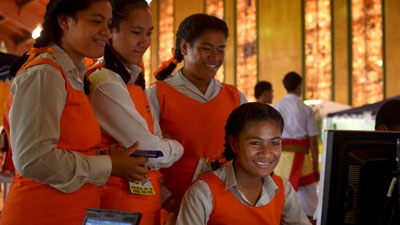Nuku’alofa, Tonga – The internet’s importance to connect people around the world cannot be overstated. It is even more important for Tonga. Not only because of the country’s remote location in the South Pacific Ocean with a population dispersed among dozens of small islands, but also due to its significant diaspora population.
"There are more Tongans living overseas than there are in Tonga and the internet is our connection to them. Our link for sending money, remittances, and keeping in touch with our family and friends," said Tevita Vahai, leader of a local youth dance group.
Underwater broadband internet cable has landed
In August 2013, the Kingdom of Tonga celebrated a landmark event. An 827km fiber optic cable had landed in the country’s capital, Nuku’alofa, for the first time bringing high-speed internet to the island nation.
Like many Pacific Island countries, Tongans previously depended on costly satellite links which, too often, provided unreliable internet service, with slow speeds and limited bandwidth. Simple files could take hours to download, particularly at peak times, and consumers faced high costs for patchy connections.
Impacts of broadband internet
The arrival of broadband internet is already being felt. Tongans are seeing more ICT applications and services, and internet access is growing more affordable: the household price for a month of internet service, per gigabyte, has fallen by 60 percent. The country has opened its first call-center and many Tongan businesses, health centers, and schools are enjoying cheaper, faster connections.
As prices drop, services improve, and more people subscribe, many Tongans have big plans for improved connectivity, which promises to help local businesses, drive jobs and investment, and enhance services across islands.
Dr. Paula Vivili is acting superintendent of Vaiola Hospital on the main island, and the country’s only eye surgeon. He spends much of his time between Nuku’alofa and the remote Outer Island of Niuatoputapu and supports training programs between other Pacific Island countries.
“This fiber optic cable will allow our doctors to communicate more easily with health workers on other islands also with doctors overseas. We are planning live surgery with overseas partners, getting a live feed to what is happening here in Tonga, and directing the doctors in complicated surgery,” explained Dr. Vivili already preparing on how arrival of broadband internet can improve health services.
While for farmer Minolu Nishi, the potential for what reliable, high-speed internet can provide Tongan businesses is huge.
“Our accounts, records and sales will all be online, and we’ll be able to have face-to-face conversations with international buyers. I can see our growers using smartphones to manage any pests in the field – photographing them, identifying them and then learning how to deal with them, quickly,” says Minolu.
“It means our farmers no longer have to go overseas to further their knowledge,” he says.

